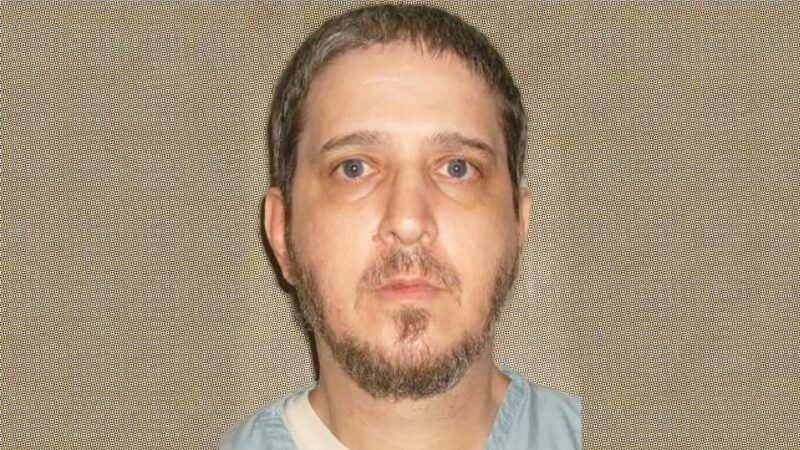Oklahoma Says Richard Glossip Was Denied a Fair Trial. An Appeals Court Still Won't Overturn His Conviction.
"While I respect the Court of Criminal Appeals' opinion, I am not willing to allow an execution to proceed despite so many doubts," said Oklahoma's attorney general.

Oklahoma death-row inmate Richard Glossip is facing another setback in his 25-year effort to prove his innocence. On Thursday, an Oklahoma appeals court upheld Glossip's murder conviction, despite a request from the state's attorney general filed earlier this month seeking to vacate Glossip's conviction and retry the case.
Richard Glossip was convicted for the 1997 murder of his boss, Barry Van Treese. However, no one asserts that Glossip killed Van Treese himself. Prosecutors asserted that Glossip, who had been working as the manager of a motel owned by Van Treese, had paid Justin Sneed, a 19-year-old maintenance man, to kill Van Treese.
The only direct evidence linking Glossip to the murder came from Sneed's testimony—testimony that he only agreed to give as part of a plea deal that allowed him to escape the death penalty for murdering Van Treese.
Glossip's conviction was overturned in 2001 when an appeals court thought "the evidence at trial tending to corroborate Sneed's testimony was extremely weak." But he was reconvicted and resentenced to death for the crime in 2004.
Giving more reason to doubt Sneed's testimony, in the years since Glossip's conviction, Sneed has left cryptic messages hinting that he possibly wished to recant his testimony against Glossip. In 2007, Sneed wrote to his lawyer about Glossip's case, "There are a lot of things right now that are eating at me. Somethings [sic] I need to clean up," adding that he was "going to try to contact the indigent defense over [Glossip's] case or the D.A.'s."
In the years since his conviction, Glossip has narrowly escaped execution several times, receiving four separate stays of execution and even being served three last meals. However, things started to look up for Glossip following the release of an independent investigation into his case in 2022. The report concluded that the state had deliberately destroyed evidence in Glossip's case, with investigators stating that they "uncovered additional evidence, never presented to the jury or to any court, that would likely have led to a different outcome in the case."
Following the release of this report and the conclusion of a separate independent investigation earlier this month, Oklahoma's Attorney General Gentner Drummond announced that he had filed a motion requesting an appeals court to overturn Glossip's conviction and seeking a new trial in the case.
"After thorough and serious deliberation, I have concluded that I cannot stand behind the murder conviction and death sentence of Richard Glossip," Drummond said in a statement on April 6. "I do not believe that justice is served by executing a man based on the testimony of a compromised witness."
However, this wasn't enough for Oklahoma's Court of Criminal Appeals. On Thursday, the court concluded that Glossip hadn't provided enough new evidence showing that he needed a new trial.
"This case has been thoroughly investigated and reviewed in numerous appeals. Glossip has been given unprecedented access to the prosecution files, including work product, yet he has not provided this Court with sufficient information that would convince this Court to overturn the jury's determination that he is guilty," wrote Judge David B. Lewis.
"For over 20 years, the facts, evidence, and law relating to this case have been reviewed in detail by judges and their staffs through every stage of appeal allowed under our Constitution," concurred Judge Gary L. Lumpkin. "At no level of review has a court determined error in the trial proceeding of this Petitioner nor has there been a showing of actual innocence."
Despite the ruling, Drummond quickly announced that he would nonetheless refuse to allow Glossip's execution—which is currently planned for May 18—to go forward. "While I respect the Court of Criminal Appeals' opinion, I am not willing to allow an execution to proceed despite so many doubts. Ensuring the integrity of the death penalty demands complete certainty," he wrote on Thursday. "I will thoroughly review the ruling and consider what steps should be taken to ensure justice."
While the case against Richard Glossip has always been deeply flawed, his decades of failed attempts to overturn his conviction—and his narrow brushes with death—show just how hard it can be to prove your innocence, even when your own state concludes that it has little evidence against you.
"It is unconscionable for the court to attempt to force the State to move forward with his execution," said Don Knight, Glossip's attorney, in a Thursday statement. "We cannot permit this longstanding injustice to go unchallenged and will be filing for review of this manifestly unjust ruling in the United States Supreme Court."


Show Comments (24)